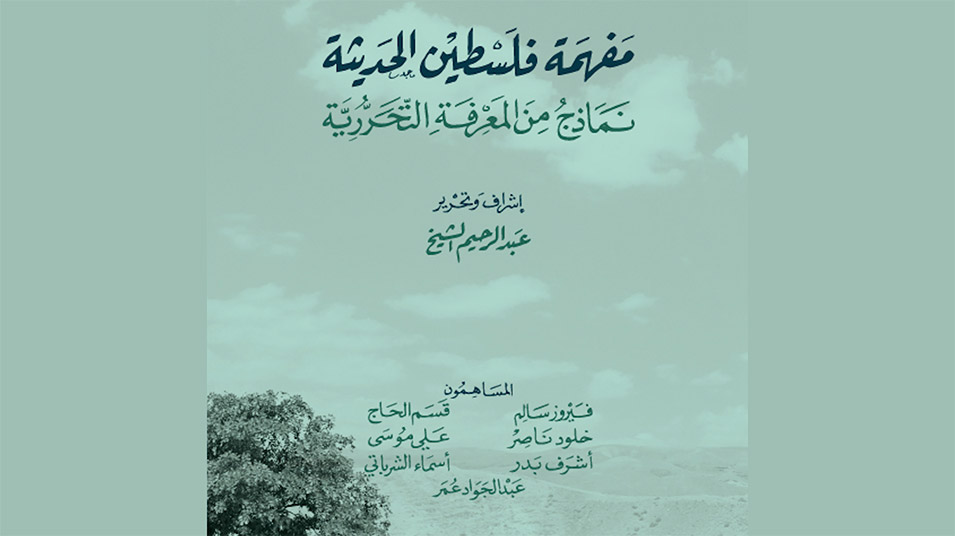Birzeit University Ph.D. students publish collaborative anthology on modern Palestine
A new book comprising seven contributions from Ph.D. students at Birzeit University has recently been published in collaboration with the Institute of Palestine Studies.
Entitled “Conceptualizing Modern Palestine: Exemplars of Liberating Knowledge,” the book was supervised and edited by Professor Abdul-Rahim Al-Shaikh, of the Department Philosophy and Cultural Studies, and includes chapters by Fayrouz Salem, Kholoud Nasser, Ashraf Badr, Qasam al-Hajj, Ali Musa, Asma’ al-Sharbati, and Abdaljawad Omar, all of whom are currently enrolled in the university’s Doctorate in Social Sciences.
As Al-Shaikh describes in his trenchant introduction, the book represents an “epistemological step” for “conceptualizing modern Palestine, both as an identity and as a cause.” The contributions of the book, he adds, “draw on various methodologies and approaches that attempt to portray Palestine in its fragmented geography and demography, as well as its diverse culture.”
Al-Shaikh further noted that the book represents part of a series of further research anthologies, seeking to transcend both the theoretical lag and chaotic conceptualizations of what Palestine means as a “colonial condition” between various currents all vying to appropriate “Palestine” within its own theoretical capital, including post-colonial studies, settler colonial studies, indigenous studies, militant research, and the undercommons.
Arguing for liberatory knowledge production in Arabic, the book, adds Al-Shaikh, targets Palestinian and Arab readership both inside Palestine and the wider Arab world, managing in the process to challenge the current hegemony of knowledge production in foreign languages—English, French and to a lesser extent German—that work to portray the condition of “modern Palestine,” which incidentally also metamorphosed in official Palestinian discourse as the “New Palestine.” As such, “Conceptualizing Modern Palestine: Exemplars of Liberating Knowledge” includes a double-critique, one that challenges the ideological stability of the Zionist colonial project, and another that challenges the transmutations within the Palestinian national liberation project, on various levels of analysis including cultural, sociological and political.
In addition to the theoretical framing encapsulated in its introduction, the book, through the seven contributions therein, tackles the grand classics of Palestinian national identity: the land, the people, and the narrative. Fairouz Salem, with her extensive background in international relations and strong interest in the anthropology of the Palestinian countryside and the developmental questions pertaining to marginalized communities, touches upon the intricacies of the first pillar of modern Palestine, the land, in her study entitled: “From the Halls of Colonial Military Courts to the Land: The Everyday Struggle over Palestinian and Space and Time in the Palestinian Aghwar.”
Touching upon the second pillar of modern Palestine, that is the people, Kholoud Nasser, with her academic and professional background in the fields of public and community health, educational policies, and development studies, addresses the “Question of Demography: Between Current Palestinian and Israeli Trends,” locating her work within a broader field of colonial studies in the context of the Israeli apartheid in Palestine.
By investigating the outlines of Palestinians on the land, the former political prisoner in Israeli jails, Ashraf Othman Bader, who specializes in Israeli studies, attempts in his study to scrutinize the role of disgust in the colonial matrix of power. His study, entitled “Disgust as Colonial Mechanism: Zionist Settler Colonialism as an Exemplar,” deconstructs the psychosocial structure of the Zionist “victimization” complex that, he argues, projects outwards in the form of disgust as apparent in the handling of Palestinian colonized bodies. As for Qasam Al-Haj, whose research interests combine the fields of politics and culture, specifically focusing on disentangling Palestinian cultural and educational politics, chooses in her study, "Curfews and Military Closures: The Arrest and Liberation of Palestinian Spacetime,” to theorize and further abstract the relationship between the land and the people by investigating the role of curfews in arresting spacetime in the Palestinian experience.
The three other contributions in the book move from the realm of land and people to the realm of narrative as a central marker in the Palestinian national narrative, specifically in its cultural, social, and pedagogic manifestations. Ali Musa, a researcher in the social history of Palestine interested in investigating individual and collective memory as they relate to cultural identity, employs the memoirs, autobiographies, and diaries to construct his study on “The Dimensions of Palestinian Identity in Autobiographies and Memoirs in Nablus between 1948 and 1967.” While Asma Al-Sharbati, who works in the "Field of Hope" — from human development and curricula design to developing administrative and communication skills — attempts in her study to critically engage with Palestinian textbooks by investigating what she describes as “Images of Agency in Palestinian Textbooks." Finally, Abdaljawad Omar, with his background in philosophy and international studies, explores the decline of “collective” expression in the milieu of Palestinian cultural identity through a comparative study of the writings of Ghassan Kanafani, Edward Said, Murid Barghouti, and Mahmoud Darwish in his piece entitled: “After-Palestine: Palestinian Cultural Discourse and the Tragedy of Defeat.”
Published with the support of Birzeit University and the Institute of Palestine Studies, two institutions closely tied through their extensive historical relations, shared missions, and national goals, the book represents a milestone in defining the relevance and importance of Palestine Studies, from the heart of the geographical center of historic Palestine.







